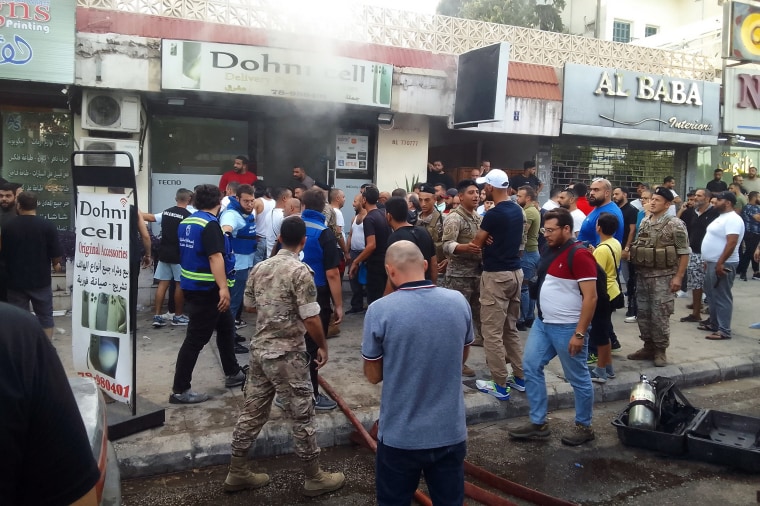A second wave of explosions from the device hit Lebanon on Wednesday, killing nine, injuring 300 and igniting fires across the country a day after hundreds of pagers belonging to members of Hezbollah detonated in an unprecedented attack on the militant group .
The Lebanese Red Cross said it deployed 30 ambulances to southern Lebanon and the Bekaa Valley in response to the walkie-talkie blasts.
Meanwhile, the country civil defense Forza said crews were working to put out fires “inside houses, cars and shops” that were ignited by the explosions.
Al-Manar, a Hezbollah-affiliated news agency, said wireless devices exploded in people’s hands.
Lebanon’s National News Agency, or NNA, said some of the devices were branded as Icom, a company that sells radio communications, including at least one Icom V82, a portable transceiver. Icom did not immediately return a request for comment.
U Associated Press reported that its own reporters were in Beirut at a funeral for four people killed by the explosion of pagers a day earlier when they heard “multiple explosions at the site.”
Ambulances arrived at the scene, AP reporters said.
On Tuesday, the explosion of pagers belonging to members of Hezbollah killed at least 12 people and injured nearly 3,000.
Two U.S. officials said Israel was behind the attack targeting Hezbollah, an Iranian-backed militia and political party that the U.S. considers a terrorist organization. The militant group and Lebanese officials also blamed Israel, which has not publicly taken responsibility.
It was unclear why Israel carried out the attack when it did and whether it was an opportunistic operation or something more strategic that would be followed by other actions, the officials said.
Lebanon’s Public Health Minister Dr. Firas Abiad said 12 people were killed in Tuesday’s attack, including an 8-year-old girl and an 11-year-old boy. More than 2,700 were injured, with an estimated 10% in critical condition, according to the National News Agency.
Lebanese Prime Minister Najib Mikati said he was visiting the public health ministry’s emergency operations center when news of the walkie-talkie blasts broke. He told reporters that he has instructed the country’s foreign minister to request a meeting of the UN Security Council to address the matter.
“What happened is deplorable – it is a collective crime that defies humanity and human rights, targeting defenseless people in their own homes,” Mikati said.
Mikati along with other Lebanese government officials have repeatedly said they do not want the country to be dragged into a war, but they have not stopped short of condemning Hezbollah’s attacks on Israel.
Also on Wednesday, the Israeli commander said that troops near the border were “on the edge of readiness”.

“The mission is clear – we are determined to change the security reality as soon as possible,” said the head of the Northern Command of the Israel Defense Forces, Major Gen. Ori Gordin
Hezbollah has exchanged fire with Israel since October as it aligned with Hamas following the Palestinian group’s October 7 terrorist attack.
International officials have worried for months that exchanges between Lebanon and Israel’s shared border could prolong the Israel-Hamas war and further destabilize the region.
Thousands of civilians in southern Lebanon and northern Israel have been displaced by the exchange of fire between Hezbollah and the Israel Defense Forces.
Israeli Prime Minister Benjamin Netanyahu’s office said Monday that he and his cabinet have updated their list of war targets to include the safe return of its residents to the north.
Officials in the country have also warned the United States, its closest ally, that “military action” would likely be the only way to deal with growing hostilities with Hezbollah.
In remarks to forces at Ramat David air base on Wednesday, Israeli Defense Minister Yoav Gallant said he believed the country was in a “new phase of war”.
“The ‘center of gravity’ is moving to the north, which means we are allocating forces, resources and energy for the northern arena,” Gallant said, adding that they must allow residents to return home.
